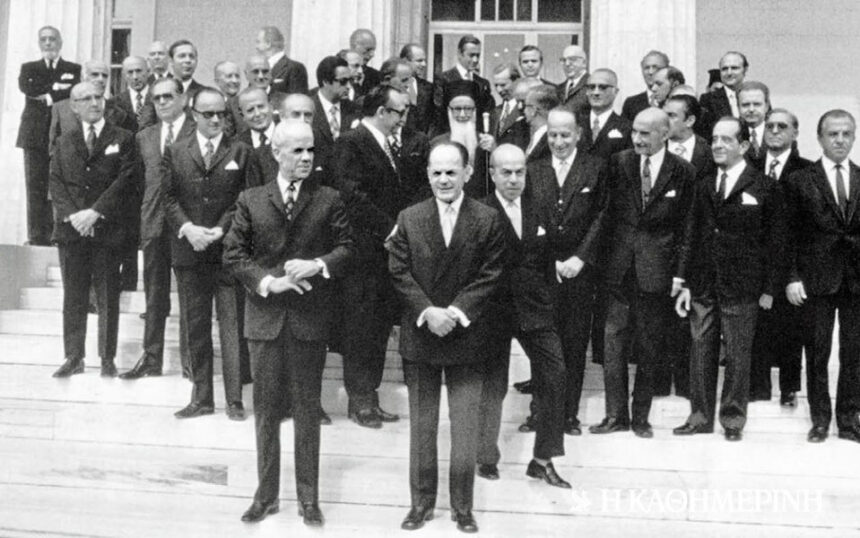In October 1973, George Papadopoulos decided to implement the plan to liberalize the Hundred regime of April 21, launching the so-called “Marquezini experiment”. He therefore turned to Spyridon Markezini, a politician with a long career in the Hellenic Alarm, the Center Union and later in the Progressive Party, in order for the latter to assume the prime ministership, thus “politicizing” the “revolution” and “democratizing” the regime.
Beyond the “restoration” of parliamentarism, liberalization essentially aimed at legitimizing an already institutionalized model of power. Its main purpose was the preservation of the army as an autonomous, sovereign and decisive power center within the quasi-democracy that would ensure the functioning of the Parliament and thus the representation of the people in the political process.
Marquezini’s intention was to lead the country to free elections after the revision of the 1973 “Constitution” (which limited the extensive powers of the President of the Republic), however the political leaders of the opposition did not appear willing to participate in the elections, stating that the parliament would be “castrated” and essentially unable to make decisions. Of course, as was seen from an article by Georgios Ralli in “Vradini”, the opposition’s abstention from the elections would only be justified if the Papadopoulos regime refused to observe and preserve the rules for conducting free elections. In the end, personalities such as Averov, Novas and Stephanopoulos supported Markezini’s effort. Meanwhile, Constantinos Karamanlis, who was in Paris, made absolutely no statement, but seemed to doubt the chances of success of the “experiment.”
However, the main problem facing the “Marquezini experiment” was the attitude of the army itself and the regime’s officials. Although Papadopoulos had taken care to sideline the rest of his co-conspirators, concentrating power in his hands, he had not managed to do the same with the “invisible dictator”, Brigadier Dimitrios Ioannidis, commander of the Hellenic Military Police (HSA) during the dictatorship . Ioannidis had managed to expand his information and control networks in the Armed Forces, while closely monitoring the movements of Papadopoulos himself as well as his close associates. Apparently, Papadopoulos had repeatedly tried to weaken and even demobilize Ioannidis, but the latter’s strong reactions thwarted these plans.
In fact, the turn that the “revolution” had taken did not agree with the lower ranks, mainly officers: the declaration of Papadopoulos as President of the Republic after the July “referendum” and the prospect of perpetuating his presence in this critical position ( the “Constitution” of 1973 provided for a seven-year term, i.e. until 1980), were opposed by the officers who considered Papadopoulos’ liberalizing moves to be a “betrayal of the Revolution”. Ioannidis had taken care to secure the support of those disaffected senior and junior officers, which proved to be a decisive factor in the course of events that followed.
The Marquesini government was to be short-lived – it only lasted 49 days. The escalation of the student reactions, which had started since the beginning of 1973, led to the revolt of the Polytechnic and its violent suppression by the dictatorial regime. The Markezini government proposed to the President of the Republic Papadopoulos the declaration of martial law. As it turned out later, Papadopoulos, taking advantage of the events at the Polytechnic, mobilized military units from all over Greece, the size of which was not justified by the events of the day, in an attempt to regain control of the army. Also, the declaration of martial law on November 17 can be seen as Papadopoulos’ last attempt to prevent any military action against him.
As it turned out, however, his moves were in vain, as Ioannidis put into action the long-organized plan to overthrow Papadopoulos, whom he literally caught sleeping on November 25. The “Marquezini experiment” had failed miserably, and the country passed into the next dictatorship, this time under Ioannidis, which lasted eight critical months.
Column Editor: Myrto Katsigera, Vassilis Minakakis, Antigone-Despina Poimenidou, Athanasios Syroplakis




